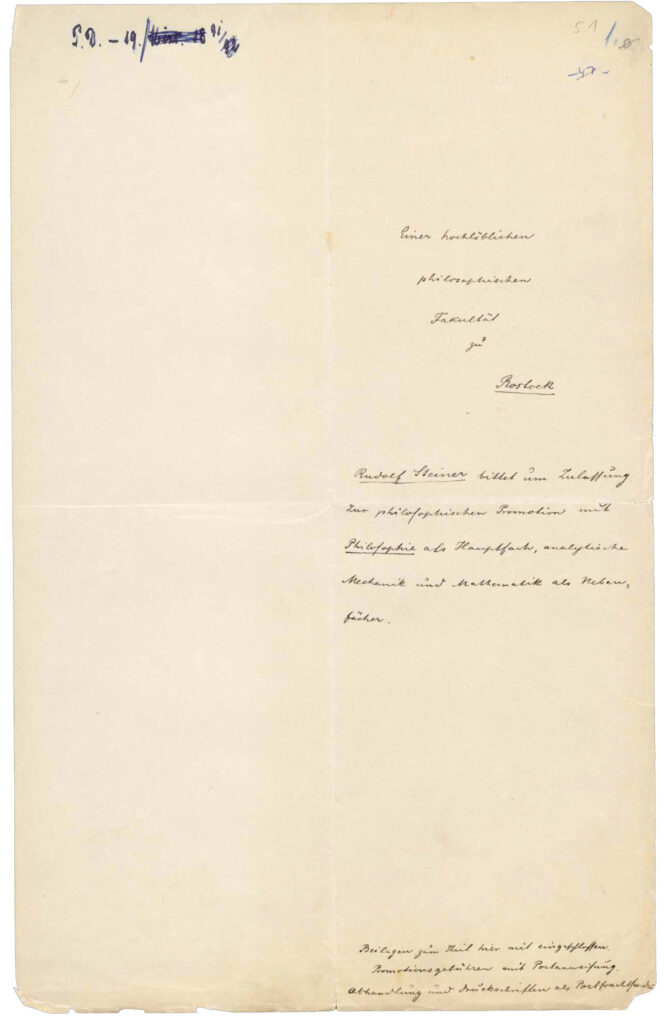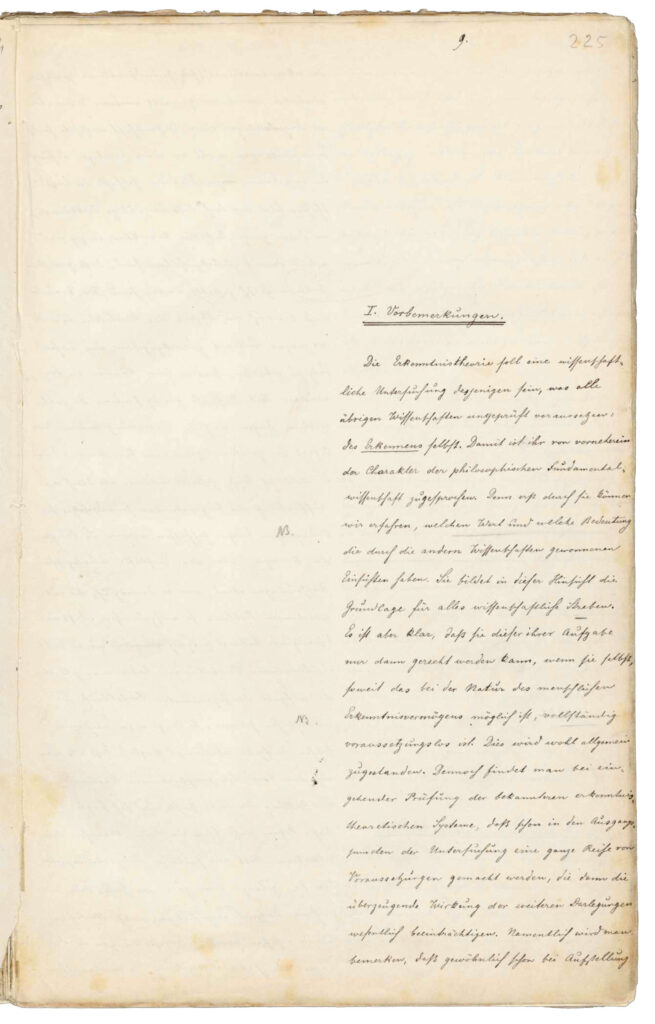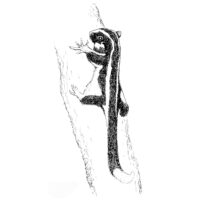Marginalia on Rudolf Steiner’s Life and Work 24. In Memory of Friedwart Husemann.1
A few months before moving to Weimar where he was to publish most of ‹Goethes Naturwissenschaftlichen Schriften› [Goethe’s Scientific Writings] as part of the first Goethe Complete Edition, Rudolf Steiner began exploring his possibilities for a doctorate. On the one hand, he probably wanted to catch up with his future archive colleagues, who all had doctorates. The head of the archives, Bernhard Suphan, naturally assumed that Steiner was a doctor too, and referred to him as ‹doctor› in his letters in 1889. On the other hand, he wanted to acquire an academic degree because this was a prerequisite for his long-term goal: a lectureship in philosophy. In Austria, there was no possibility for him in this regard: «I had officially finished Realschule [Secondary Schooling till Grade 10] […] That ruled out doctoral studies in Austria. I had grown into ‹philosophy› but had an official course of education behind me, which excluded me from everything in which the study of philosophy places people.»2 Even his regular university studies at the Vienna University of Technology3 didn’t give him the basis in Austria to acquire the only academic degree that existed there at that time – the doctorate. It was reserved for university graduates who had attended previously the Gymnasium [Secondary School till Grade 12] and thus acquired knowledge of classical languages.
To obtain basic information on how and where a doctorate would be possible for him, Steiner turned to Bertrand Claisé (1834–1923) in Breslau in May of 1890. Claisé was kind of a ‹doctoral mediator› who had been offering «Promotio in ab-et praesentia» in newspapers since the 1870s, which one could «acquire in a simple way at European universities […] in accordance with the regulations.» In exchange for «sending in a Curriculum Vitae and a fee of 10 florin» candidates could receive «instruction, advice, aid» according to their personal circumstances.4 Steiner wrote to him in June 1890: «I want to emphasize […] once again that for the time being it is only a question of the right to be allowed to use the title of doctor socially. Therefore, if you could get it for me in the spirit of your letter without examination, that would be worth it to me. I would then ask for your mediation again a little later to obtain the exam-based title. However, for the time being, as I said, the title is important to me.»5

In the letters, it becomes clear that he wanted to get the title before his entry into Weimar if possible, but that he certainly wanted to earn it the traditional way, that is, based on examinations.6 In the end, the decision was made in favor of Rostock as the place for his doctorate, on the one hand probably because of the moderate doctoral fees, but on the other hand also because Steiner was reading a «philosophical work» at that time that «captivated him extraordinarily. The work ‹Seven Books of Platonism› by Heinrich v. Stein, who was teaching philosophy in Rostock at that time.»7 As can be seen from von Stein’s friendly reply of November 15, 1890, Steiner had contacted him by letter. Even though von Stein had initially suggested to Steiner – based on his previous literary works – to consider «whether the forum of German language and literary history […] would be more favorable to you than the actual philosophical one,»8 he still accepted him as his doctoral student. A glance at the list of dissertations of the University of Rostock in the Faculty of Philosophy shows that at that time, only very few philosophy doctorates were being completed there. In the five years I reviewed9 in the period of Steiner’s dissertation, I found only three other doctorates in philosophy under von Stein – the vast majority of dissertations were in chemistry.

Prelude
Steiner graduated from the middle school as the best of his class in 1879 and had achieved excellent grades in the individual examinations at the Technical University. 10 If he had only been interested in the title – perhaps even with a predicate – he could have sought an unproblematic, for example, philosophical-historical topic. Instead, his dissertation was to become a ‹prelude› to his ‹Philosophie der Freiheit› [Philosophy of Freedom,] a step on his inner path of thought. Out of all this arose conditions that made the receipt of a predicate for the doctorate very unlikely from the outset:
- As with most of the other doctoral students, he had not studied at the University of Rostock – and he was not a ‹Latin scholar,› given that he hadn’t graduated from a Gymnasium. He therefore needed a dispensation from § 1a of the doctoral regulations, «of which, however,» said von Stein, «I may well assume that the faculty will grant you the same. I judge so according to the overall impression of your literary activity so far.»11 He shared these two conditions however with the vast majority of the Rostock doctoral students.12
- He was known as a «literary writer,» that is, as a public author and not a scientist. Therefore, von Stein emphasized: «Since you still have to submit a special doctoral thesis, I would like to ask you to give it a rigorous scientific form, since we have been setting our requirements quite high for a long time, especially on this side. I understand this to mean a reasonably complete, outwardly prominent examination of the literature of the subject in question, precise citations, and methodical arguments. The writings kindly sent to me seem to pursue more a general literary point of view than ‹guild› (sit venia verbo)13 science.»14
- He had a study in another field behind him – even if all his study subjects were still counted towards the philosophical faculty at that time. Thus, he had to reckon with being, as it were, more critically appraised from the outset than a man of the guild.
- On essential issues, he turned against the then generally highly esteemed Kant. Von Stein writes: «But, for example, your dissent from Kant, which is now being explored so inexhaustibly again, and rightly so, as I believe, in principle, you would have to discuss even more rigorously than has been the case up to now.»15
Doctor of Philosophy and Liberal Arts
Precisely for this reason, or to check the knowledge of his candidate on this issue, Heinrich von Stein chose Kant as the main topic of the oral examination: «[…] in philosophy, the basic concepts of Kant are discussed in detail, then more briefly those of Spinoza and Leibniz.»16 Steiner regretted this: «I wanted so badly to be asked about something in the oral exam that had something to do with the ‹Sieben Büchern Platonismus› [Seven Books of Platonism]; but not one question referred to it; all were taken from Kant’s philosophy.»17 On August 28, 1891, von Stein gave his expert opinion on Steiner’s submitted paper – basically positive, but with minor objections, as was to be expected from a ‹lateral entrant› from the natural sciences: «In the work submitted to us, as in his earlier achievements, the applicant shows himself to be a man of literary dexterity, of good, if perhaps not necessarily complete orientation, of striving for independent and well-founded evaluation. I don’t want to subscribe to every judgment of it, but the basic tendency to get beyond one-sided subjectivism is only to be approved of, and the execution is appropriate, even if not always as new or convincing as the author himself seems to presuppose. I can recommend admission to the exam, even with the granting of a dispensation.»18 On October 23, 1891, at 6 p.m. Steiner took the oral exam in three subjects, which he chose himself from the twenty or so subjects available at the faculty. In addition to philosophy, he was also tested «in mathematics: fundamentals of differential and integral calculus, the geometry of conic sections» and «in analytical mechanics: theory of moments of inertia, of the motion of rigid bodies, of the principle of living force» – both by the mathematics professor Otto Staude (1857–1928). At the end of the minutes of the oral examination, it says: «The doctorate was decided unanimously, a predicate was not requested.»19 In the ‹rules of procedure for the doctorate at the Faculty of Philosophy at the University of Rostock› of March 18, 1891, it says under § 8: «Special grades ‹cum laude›, ‹magna cum laude›, and ‹summa cum laude› are awarded for particularly outstanding achievement.»20 Grades could be requested by the supervisor – in this case von Stein – but he rarely did this apparently: in the four doctoral files in philosophy that I looked through in the Rostock University Archives, I only found one work for which he had applied for a grade (‹magna cum laude› for Lothar Volz’s work.) However, this was the applicant’s second thesis submitted after the first had been rejected. The candidate had then enrolled in Rostock for two semesters, studied philosophy with von Stein, and written a new doctorate, probably supervised by von Stein.21 In the application of the Faculty of Philosophy to the Grand Ducal Ministry of Mecklenburg for permission to receive a doctorate from the faculty, it is therefore stated that: «After the faculty has accepted the paper submitted as a dissertation, and an oral examination in philosophy, mathematics, and analytical mechanics has been held with the applicant today, which he passed satisfactorily, the Faculty of Philosophy respectfully requests the High Ministry to grant the procuration required for the doctorate to the undersigned dean.»22

Even if it sounds here as if only the examination was graded, «the quality of the dissertation and the examination were actually taken into account in the affirmation.»23 Therefore, there was no predicate for Steiner’s dissertation, but it was certified that he had passed the dissertation ‹satisfactorily›, that is appropriately: «An excellent man and scholar, the Austrian Rudolf Steiner, submitted a dissertation which, after rigorous examination, he passed properly, entitles him to be a doctor of philosophy and liberal arts.»24 The diploma was awarded only after 150 copies of the dissertation had been printed. Steiner then had the work published under the title ‹Truth and Science›. Prelude to a ‹Philosophy of Freedom› – extended by a preface and a «practical final consideration,» in which he was able to emphasize even more clearly what concerned him when writing: «The most important problem of all human thinking is this: to understand man as a free personality founded on himself.»25
Translation Monika Werner
Footnotes
- The last email I received from Friedwart Husemann shortly before his unexpected death on March 2, 2022, was the question forwarded to me by a young physician about Steiner’s doctoral grade. This was the reason for me to take a closer look at the circumstances of his dissertation and the University of Rostock in the early 1890s.
- Rudolf Steiner, Mein Lebensgang [Autobiography]. Rudolf-Steiner-Verlag, Dornach 2000, p. 198.
- Cf. «Warum machte Rudolf Steiner keine Abschlussprüfung an der Technischen Hochschule?» [Why Didn’t Rudolf Steiner Take the Final Exam at the Technical University] in: ‹Goetheanum› 45/2020.
- Die Neue Zeit [The New Era], Olmüzer political newspaper, **1.12.1874.
- David Hoffmann, Walter Kugler, Ulla Trapp (Hg.), Rudolf Steiner’s Dissertation. Dornach 1991 (Rudolf Steiner Studies, Vol. V), p. 178.
- In the meantime, he considered seeking an English ‹diploma› but distanced himself from it again since, at that time, a ‹Dr. Peratoner› was arrested in Vienna for various shenanigans; among other things, the legitimacy of Peratoner’s doctoral diploma was also questioned (see All Letters 1, **Dornach 2021, pp. 422–424). There was heated discussion in Germany in the 1870s about reforming the doctorate after a candidate received his doctorate in Rostock with ‹maxima cum laude› with transcribed lecture notes. In particular, the historian Theodor Mommsen distinguished himself with reform proposals, whereupon the subsequent Berlin aesthetics professor Friedrich Latendorf wrote him an open letter that stated, among other things: «Anyone who knows the matter better will have to ask in amazement: Why the noise? As if the gentlemen who shout so bravely did not themselves know best that all the doctor’s doctorates are based on vain lies and deception, in which only rarely a grain of truth can be found! Of a hundred doctoral dissertations which have come to light in Germany – not to the world, but only to the press of the university book printer – at most ten percent are the actual work of the one who calls himself the author and certifies it. And even of these, not five percent are worth printing. I will admit that of the remaining ninety percent, about twenty are made only with the substantial assistance of others. Certainly, however, the doctorand has not so much interest in the remaining 70 percent as the copyist who copied the manuscript.» (In: Die Reform der Doctorpromotion [The Reform of the Doctorate]. **Statistical contributions by Dr. Max Oberbreyer, Eisenach, 3rd ed. 1878).
- See note 2, p. 198.
- See note 5, p. 188.
- The years 1888/89, 1890/91, 1891/92, 1892/93, 1894/95 based on the ‹Jahresverzeichnis der an den Deutschen Universitäten› [Annual Directories of German Universities] published writings.
- Ten times ‹excellent›, three times ‹very good› and six times ‹good›; see Martina Maria Sam, Rudolf Steiner: Kindheit und Jugend. [Childhood and Youth] **S. 435–437.
- See note 5, p. 188.
- In 1890/91 almost 70% of doctoral students were non-Latin («immaturi») according to the missive of November 8, 1891, University Archive Rostock.
- «Entschuldigen Sie das Wort» [Excuse the Word].
- Letter from November 15,1890, see note 5, p. 188.
- Ibid. This could also refer to a preliminary treatise sent in by Steiner, of which the letter to Claisé of July 24, 1890, states that he was working on it: «Fichte’s theory of knowledge and the punctum saliens of all epistemologies. Prolegomena to any future theory of science.» It is possible then that the dissertation submitted is ‹The Basic Question of Epistemology with Special Consideration for Fichte’s Theory of Knowledge. Prolegomena for the Understanding of Philosophical Consciousness with Itself› already a revised version of the same.
- Thus, in the minutes of the oral examination of October 23, 1890, RSS 5, p. 202.
- See note 2, p. 201.
- See note 5, p. 199.
- Ibid.
- University Archives Rostock.
- The three other doctoral students are Ernst Peltzholtz (1870–1952) with ‹Die Hauptpunkte der Hume’schen Erkenntnislehre› [The Main Points of Hume’s Epistemology], Berlin 1895, Lothar Volz (1867) with ‹Die Erkenntnistheorien bei Leibniz und Kant› [The Epistemologies of Leibniz and Kant], Rostock 1895, and Friedrich Bark (1867–1914) with ‹Descartes’s Lehre von den Leidenschaften› [Descartes’s Doctrine of Passions], Rostock 1892. The latter – the only doctoral student in philosophy during the academic year 1891/92 besides Rudolf Steiner – married Anna Steiner’s eldest daughter, Emma Eunike, in 1906.
- See note 5, p. 203.
- According to the missive of June 18, 1900, of the Faculty of Philosophy Rostock, in which, among other things, the problem was named: «Our diplomas actually only give the examination a predicate and completely leave out assessment of the dissertation.».
- In the documentation volume on Steiner’s dissertation (see note 5,) p. 206 f., the doctoral certificate written in Latin is shown – a ‹rite› **completed doctorate was originally the proper, that is, ‹regular› doctorate in contrast to an honorary doctorate. Since the introduction of predicates, however, the ‹rite› doctorate has also been included in the evaluation round, so to speak. Since then, a doctorate without predicates has been regarded as the lowest grade. When the change took place from ‹rite› as a simple statement about a properly completed doctorate to the understanding of ‹rite› as a grade (in the sense of a statement of quality) would need to be explored.
- Rudolf Steiner, Wahrheit und Wissenschaft [Truth and Science]. GA 3, 6. Vol. Basel 2012, p. 99.













